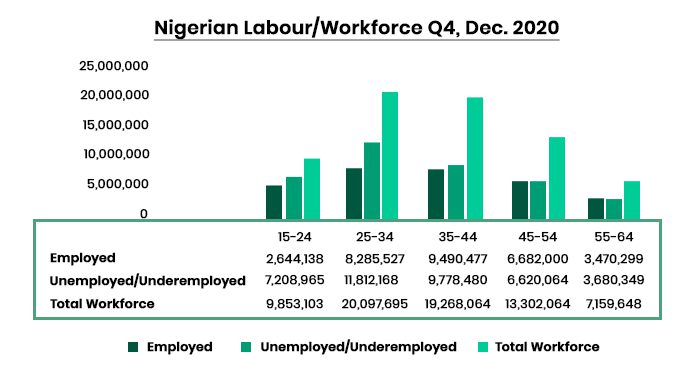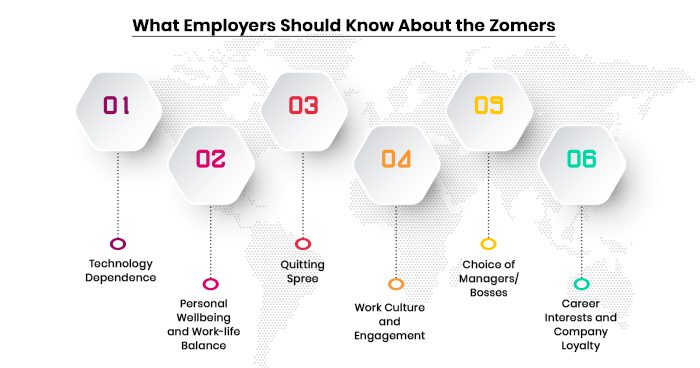For over two decades, there has been a surge of the first generation to disrupt traditional working, i.e., the Millennials – joining the workforce as the youngest generation in various organisations. As time passes, newer and younger generations will begin to infiltrate and will soon outnumber the older generations in the workforce. This next wave of generation, so-called “newbies” in today’s workforce are the “Generation Z” also known as the “Gen Z”, “iGen” or the “Zoomers”.
By understanding and analysing the different experiences of the world events, political, economic, technological shifts and how they shape the views and public attitudes of the various age groups, Pew Research Center (PRC) has been able to clearly differentiate the Gen Z (Zoomers) from their predecessors, the Millennials. According to the study and research analysis, Zoomers were born after 1996.
According to the National Bureau of Statistics, the Nigerian workforce currently has over 122,049,400 people within the working-age distribution of 15 – 64. The National Bureau of Statistics (NBS) defines the Nigerian workforce as persons readily available to be engaged in producing goods and services, thereby contributing legitimately to the Gross Domestic Product (GDP) and compensated for such work activity.
(National Bureau of Statistics, https://nigerianstat.gov.ng/elibrary/read/1238)
From the analysis, the most populated group currently in the Nigerian workforce fall within the age brackets (25-34) and (35 – 44). According to the definition of generations by PRC, this group of people are the Millennials (24 -39). On the other hand, the second least population is the age group (15 – 24), the Zoomers. The analysis shows the entrance of a new generation actively available to be engaged in the workforce with about 2,644,138 currently employed in weekly full-time jobs of 40 hours and above and about 7,208,965 either unemployed or currently engaged in jobs lesser than 40 hours weekly. The analysis also shows that the group with the least population (55 – 64), the Baby-boomers, is exiting the workforce. The reality is that the Millennials and the newbies (Zoomers) will be the most active generations in the workforce, at least for the next decade (10 years).
From receiving pay cuts to losing their jobs – it is undeniable that being the most active young generation in the workforce, the Millennials seem to be the most affected on their jobs by the pandemic. Having witnessed the impact on their predecessors, these experiences amongst other notable world and seasonal events has partly shaped the views, interests, and behaviours of the younger generation, the Zoomers. Although, there might be some difficulty differentiating the Millennials from the Zoomers because of the many similarities in their thoughts and behaviours. To manage the new wave of the workforce, organisations must prepare for the following key workplace trends:
Technology Dependence: The Zoomers are more practical than the Millennials when learning and adopting new technologies. Being born in the era of social media, smartphones and tablets, iPads/iPods, they are accustomed to and reliant on the latest technologies. Hence, this makes them more equipped with digital tools and technical skills. Their willing attitude to learn, explore and be practical on their jobs will positively impact the learning and growth culture.
Personal Wellbeing and Work-life Balance: Similar but slightly different from the Millennials, the Zoomers are more focused on their wellbeing and personal lives than the brand they work with or the income. More Zoomers are likely to engage in jobs easily structured around their daily activities. Even though it’s the same for their predecessor, job and financial security was a bigger concern to the Millennials. Engaging and retaining the Zoomers in today’s workplaces means employers must be willing to provide a healthy lifestyle such as mental health activities, work flexibility and an engaging culture that will motivate positive performance.
Quitting Spree: The Millennials have been known for hopping from one job to the other in the space of one to three years of employment in an organisation for better jobs and work-life balance. This trend seemed to concern recruiters comparing them with the older generations that were praised for their wealthier knowledge and experiences on their jobs because they stayed longer in their organisations. Being recruited in a global pandemic and remote work era, the Zoomers will leverage more on the flexibility of remote working and ensure their career success and financial stability in whichever way without having to compromise their wellbeing. More than the Millennials, they amplify their demands for better work-life and lead the waves of quitting jobs to be engaged in more flexible workplaces or starting their businesses for their wellbeing and financial stability.
Work Culture and Engagement: The culture of employee wellbeing, engagement and flexibility cannot be overemphasised as the critical drivers of employee motivation to engage Gen Z in the workplace. As a hardworking, multitasking, and problem-solving generation, their engagement and wellbeing are important for productivity on their jobs. This includes having a flexible work schedule, mental stability, and not compromising their life activities for work. This generation can be easily retained by employers that prioritise their general wellbeing and recognise the impact of their contributions and relevance in the growth of the business. By supporting the employees with the right training, coaching, tools, and other relevant resources, Gen Zs can explore their full potentials and stay engaged in their jobs. This motivates their commitment to the success of the organisation.
Choice of Managers/Bosses: Gen Zs have higher expectations of their relationships with their managers or bosses. This involves having positive, genuine, open conversations and relationships with their managers. From interviews about work experiences during the pandemic, some Zoomers agreed to have Millennial managers support their mental, social, financial, and physical stability. Prioritising the wellbeing of the employees and supporting them is clearly important to the Gen Zs, and like every other employee, it fosters their performances and commitment to their jobs and loyalty to their organisation.
Career Interests and Company Loyalty: The loyalty of this generation to the organisations they work for is partly dependent on their career interests and passion. In the bid to advance and grow in their choice of career, they would not mind being paid less or taking on internships to earn professional experience. With their academic qualifications and practical experiences, Zoomers are likely to work, be loyal and promote the interests of organisations that will enable them to explore their potentials to the fullest whilst being relevant in the positions they hold or roles they play in their workplaces and societies. Because of their creativity, innovation, and the need to work for a cause, the majority of the Zoomers may be committed to organisations and careers in technology, business & retail, and health, unlike in manufacturing, telecoms, energy, insurance and others.
Understanding the Future of Work with the Zoomers?
The future of work is the predicted work skills, practices, behaviours and environment that businesses will have to adjust to, to remain sustainable. The pandemic changed things overnight, and business leaders have had to adjust swiftly to these changes it caused in their businesses. Today, we live in the future of work that has been predicted at least a decade (10 years) ago. These include digital transformation, remote working, work flexibility, entrepreneurship, employee perks, and compensation.
By examining the current workplace transitions and changes in the business environments, only forward-thinking employers will understand the importance of younger generation talents and their impacts on the future of business. Having studied the features of this new generation of talents, it is worth considering integrating these youngsters into the organisation’s current workforce.
Digital Transformation: Gen Zs have the drive, talents and ambition to fit into today’s business requirements for survival and sustainability. We cannot talk small about the impact of their knowledge and skills in digital transformation. Technology advances and dependency being at the heart of everything they do greatly impact businesses transforming into digital culture. This generation is dependent and very practical with technology in such that it influences how they execute their jobs. Digital culture and transformation are much easier for organisations populated with more youngsters like the Millennials and the Zoomers, who are more intuitive and practical with technology for business processes and operations.
Entrepreneurship: As entrepreneurs, it is prevalent to see this generation of workers multitask and own businesses. Their creativity and problem-solving skills make them eager to work with organisations or businesses that are aligned with their passion and interests. Their innovative minds can bring new perspectives to improve business operations and results. Unlike the older generations, they are keen on working smarter to achieve better business outputs. Remote working is more than an option but a necessity for many talents from this generation. As multitaskers and result-driven people passionate about instilling values and relevance to their organisations, remote working does not hinder their commitment to delivering optimally on their jobs whilst managing their personal affairs. The Zoomers’ employees are likely to own and focus on the business success of organisations they work with if their goals align with their interests and passion.
Talent Attraction: As time passes, generations will keep ageing and exiting their organisations while the newer generations will outnumber and infiltrate the workforce. Eventually, the culture of businesses and organisations may have to adjust to the convenience of the newer generation of talents. Any employer that plans to be competitive in the labour market must be steady in recruiting and retaining younger employees. The future of organisations is today’s Millennials becoming managers of Gen Z, at least for the next ten years. The combination of both generations is the most populated group in today’s workforce. As such, their ability to thrive despite the impact of these challenging world events on their various workplaces is because of their advanced skills and influence in the work styles and culture of their current organisations or individual businesses. Having a workforce populated with young employees with the leverage to manage their work activities independently makes valuable inputs to improve businesses whilst delivering optimally on their jobs promotes an organisation’s brand image as an employer of choice to similarly skilled talents. The existence of a good number and influence of the Zoomers in an organisation makes it attractive to like-minded potential employees.
Hiring and retaining the younger generation of talents is critical for today and the future of business. Forward-thinking leaders must be intentional about strategic ways to respond to the changing demands of businesses whilst ensuring business longevity and sustainability. An important and purposeful step is focusing on the workforce’s strength, core skills, and abilities. To motivate the optimal performance of the employees, organisations must put in place the right and conducive work culture, work resources and supporting facilities, fair compensation and other competitive employee perks to retain the best talents.
Written by:

Adolrah Boyejo
Analyst


